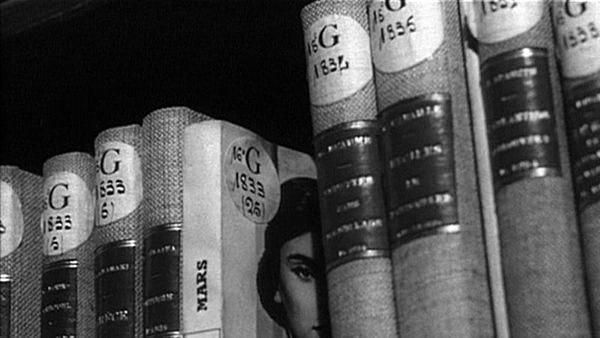Eye For Film >> Movies >> All The Memory Of The World (1957) Film Review
All The Memory Of The World
Reviewed by: Amber Wilkinson

Like Alain Resnais' 1959 short The Song Of Styrene - also included on the new release of Last Year In Marienbad - All The Memory Of The World is a winning combination of factual detail and philosophy. Its theme considering the vagaries of what will be remembered and what will not also ties neatly to Marienbad.
The film - commissioned by the French Foreign Ministry - considers the Bibliothèque nationale, in Paris, the French national library, which in addition to extensive global collections is a copyright library for everything published in the country and houses medal collections, periodical archives, maps, artwork and manuscripts.

The tone is set from the start as Rémo Forlani's script (strongly narrated by Jacques Dumesnil) considers the human mind as fallible - scenes of what appears to be an attic crammed full of books and papers in various states of decay suggesting the degradation and higgledy-piggledy nature of memory.
To control this, we're told, man has created a library "fortress", where books are held "prisoner" waiting to be released by the reader. Resnais taps into the idea of a jail, with the camera of cinematographer Ghislain Cloquet floating along above a 'guard' walking on a metal walkway that recalls both the corridors of a prison and the bars of a cage.
The smooth roving camera work - occasionally broken with quick cuts - gives the film a dramatic edge, amped up by the Maurice Jarre's stirring and playful lorchestral score. Gliding around the stacks of a library has rarely felt more portentous or exciting, with the script also creating an impression of the institution as a living, breathing creature "burrowing deeper" into the ground and reaching higher to the sky as its swallows and "digests" ever larger collections. The closest British equivalent I can think of in terms of the energy generated and control of rhythm is 1936 documentary Night Mail.
The facts of the library are all present and correct but the film plays out more like a story as we take a journey with one of the book inmates from the holding pen to its permanent cell and its trip to meet a human visitor. It's at this point that the documentary takes on a philosophical bent, asking: "Who can say what is finest, rarest or most precious here?" Who, indeed? Across the decades, this film has lost none of its memorable appeal.
This short is included on the Studiocanal release of Last Year In Marienbad
Reviewed on: 17 Sep 2018














